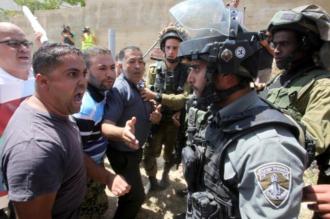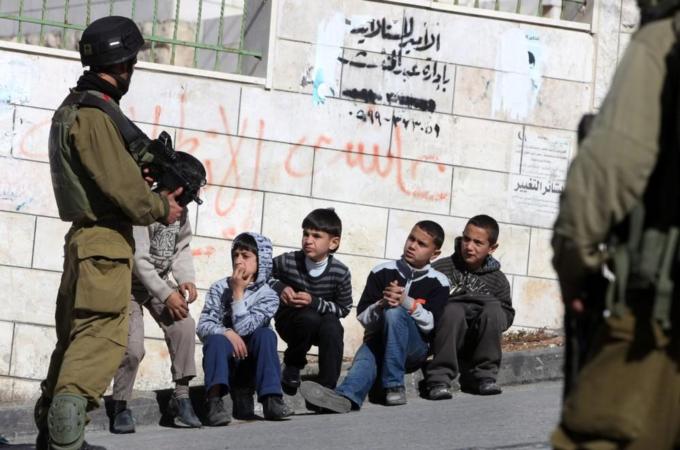Living in fear in Hebron
Thousands of Palestinian homes have been emptied in recent years, some through evictions and others over restrictions.

Hebron, Occupied Palestinian Territories – Mufeed al-Sharabati’s childhood was a stark contrast to today’s reality. Children used to play freely, and hundreds of people worked and walked every day on Shuhada Street, once a vibrant marketplace in Hebron’s old city. Now, however, his family is one of the last Palestinian families left.
As US-brokered peace talks continue between Israel and the Palestinian Authority, Palestinian residents of Hebron complain of daily violence from both Israeli soldiers and settlers alike.
“There is not a single day we don’t face harassment from either soldiers or settlers,” Sharabati, a 47-year-old retired contractor and father of five, told Al Jazeera.
In the middle of hundreds of shops and homes closed with iron-clad locks, Sharabati’s meagre two-room home is now surrounded by Israeli settler residences and military checkpoints. Up and down the street, anti-Arab graffiti blankets concrete walls.
The settlers stand outside the fence and curse at us and our children. But when the army or the Israeli police come, they do not stop the settlers from hitting us. They only come to protect the settlers, or to arrest us.
More than half a million Israeli settlers live in Jewish-only colonies throughout occupied East Jerusalem and the West Bank – colonies deemed illegal under international law – but nowhere is Israel’s military occupation as pronounced as in Hebron.
Amid the 37,000-person Palestinian population, thousands of soldiers are stationed in the “H2 area” of the city – under full Israeli military control – to protect the 600-strong Jewish settler population.
Over the past 14 years, the situation in Hebron has become increasingly painful for Palestinian residents. Since the outbreak of the Second Intifada in 2000, Israeli restrictions have turned the old city into a “ghost town”.
Attacks against Israelis in the city have also continued. In January, the military announced it had arrested two Palestinians in Hebron allegedly holding large weapons caches.
Last September, a Palestinian gunman shot and killed an Israeli soldier at a checkpoint, and hundreds of Palestinians clashed with Israeli soldiers during the following week.
Targeted attacks
But residents here accuse Israeli soldiers and settlers of instigating violence.
Sharabati moved slowly and needed assistance from his brother. He carefully sat on a narrow bed, lit a cigarette, and shuffled through medical reports, explaining he recently had back surgery as a result of being attacked by Israeli soldiers in September 2013.
That day, Sharabati aroused the suspicion of settlers and soldiers when he started moving construction supplies into his home.
While carrying a bag of sand down Shuhada Street, a soldier stopped him. A scuffle broke out that ended with his arrest. Sharabati was taken to a nearby military detention centre, where he said he was beaten by several Israeli soldiers. “They punched me and kicked me until I passed out.”
 |
| Palestinians accuse Israeli forces of siding with settlers [AFP] |
By the time he was released, Sharabati had sustained serious injuries and was in need of medical treatment that is not available in the West Bank’s hospitals. After an expensive back surgery in January and a month of hospitalisation in Amman, Jordan, he returned to Hebron in debt to the tune of several thousand dollars.
An Israeli military spokesman contacted by Al Jazeera said he could not comment on the allegations.
Since the year 2000, more than 6,000 Palestinians have been killed by Israeli military forces, according to B’Tselem, an Israeli human rights group. In that same period, however, only 16 investigation files “regarding incidents in which Palestinian civilians were killed led to indictments”, said a July 2013 report by Yesh Din, an Israeli human rights group.
Shuffling through X-rays that show new metal rods in his back, Sharabati said, for Palestinians in Hebron, “there is no difference between the violence by soldiers and the violence by settlers”.
Settler strife
In December 2013, about 25 Israeli settlers attacked the Sharabati family home. Mufeed and his brother Mohammad Sharabati, who lives in the same building, told Al Jazeera they had to put bars on their windows because of frequent attacks by settlers who “throw trash, empty alcohol bottles, rocks”.
“They have even thrown Molotov cocktails before. Maybe they had broken the windows 1,000 times before we decided to add the metal bars,” said Mufeed.
The Abu Shamsiya family lives less than 100 metres from Shuhada Street, a five-minute walk from the al-Sharabati residence. Their home is a modest concrete shack of two rooms, atop of which rests an Israeli military watchtower erected in 2000. In front of their house is a large barbed wire fence; to the back a concrete wall with one small entrance.
“The settlers stand outside the fence and curse at us and our children,” Emad Abu Shamsiya, 40, told Al Jazeera. Emad, his wife, and their five children said they are tormented by settlers every day.
“But when the army or the Israeli police come, they do not stop the settlers from hitting us. They only come to protect the settlers, or to arrest us,” he said, adding the attacks became much more frequent after he started submitting video recordings of settler violence to B’Tselem.
 |
| Israeli soldiers watch Palestinian children in Hebron [EPA] |
On January 5, settlers razed an orchard of almond trees belonging to the Abu Heikal family in Hebron’s Tel Rumeida neighbourhood.
“They came again on February 5 and uprooted cherry trees from our other orchard,” Arwa Abu Heikal told Al Jazeera by email. “And it’s not the first time. My husband and I were also attacked in 2008.”
Impunity
Though the frequency of harassment against Palestinians in Hebron is high, the city is not alone. According to the United Nations Office for the Coordination of Human Affairs, the number of settler attacks on Palestinians or their property across the occupied territories increased 144 percent between 2009 and 2011.
In March 2013, Navi Pillay, the UN high commissioner for human rights, called on Israel to prosecute settler violence and “hold perpetrators accountable”.
Another Yesh Din report from July 2013 said more than 90 percent of investigations opened into Israeli settler violence between 2005 and 2013 “were closed without an indictment being served against suspects”.
A recent publication by Al-Haq, a Ramallah-based human rights group, documented dozens of government figures in Israel, including Knesset members and state-appointed rabbis, who support and encourage settler violence.
Issa Amro is director of Youth Against Settlements, a Hebron-based group that advocates Palestinian rights in the city. Speaking to Al Jazeera, he said settler violence had intensified since US-brokered peace talks between the Palestinian Authority and Israel convened in August 2013.
“This is part of the settlers’ price-tag campaign in which settlers attack Palestinians when they are mad about Israeli policy,” Amro said. “Because they are against the peace negotiations, we see settlers attacking homes and the violence increases when there are negotiations.”
Several times the military has offered us money to leave. The settlers come and tell us that our home belongs to them … But we're not leaving.
Baruch Marzel, an Israeli politician and resident settler in Hebron, recently called Israel’s housing minister Uri Ariel a “traitor” and other Hebron settlers pelted the minister’s car with eggs during a visit to the city.
Not leaving
Hebron, known as al-Khalil in Arabic, is an important city in Abrahamic religious traditions. The tomb of the biblical figure Abraham is located at the Al-Ibrahimi mosque in the old city, and the burial sites of his sons and their wives are nearby.
Today the once-bustling streets of Hebron are closed to Palestinian traffic, alleyways are blanketed in barbed wire, and rooftops are dotted with military checkpoints and watchtowers.
Thousands of Palestinian homes have been vacated, some by eviction and others because the local economy plummeted after more than 400 Palestinian-owned stores were closed by Israeli military decree throughout the Second Intifada, according to B’Tselem.
Israeli settlers continue to strengthen their presence in the city. In the neighborhood of Tel Rumeida, a group of settlers have recently taken over land farmed by a Palestinian family for decades to launch a government-funded archaeological excavation, suspected to be a smokescreen for settlement expansion.
The US deadline for peace talks will end in two months, but so far, talks have failed to bring Palestinians and Israelis closer to a negotiated two-state solution. Meanwhile, the Sharabati family is intent on staying in its home.
“Several times the military has offered us money to leave,” said Mufeed al-Sharabati. “The settlers come and tell us that our home belongs to them … But we’re not leaving.”
Follow Patrick O Strickland on Twitter: @P_Strickland_